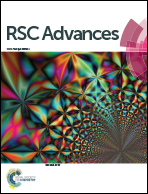High-response H2S sensor based on ZnO/SnO2 heterogeneous nanospheres
Abstract
Designing nanostructured materials to enhance gas-sensing performance is a key objective for sensor technology. In this paper, ZnO/SnO2 heterogeneous nanospheres have been successfully synthesized through annealing as-synthesized SnO2 nanospheres immersed in aqueous Zn(NO3)2 solution. Compared to the untreated pure SnO2 nanospheres and commercial ZnO gas sensors, the ZnO/SnO2 heterogeneous sensors showed exceptional electrical responses to H2S gas at 300 °C. The response of the as-obtained ZnO/SnO2 sensors towards 10 ppm H2S can reach up to 99.6. Meanwhile, the sensors exhibited obvious sensitivity and fast response/recovery behavior towards trace H2S gas, and achieved a detection limit of less than 1 ppm. Moreover, the gas test results revealed that the design of the ZnO/SnO2 heterogeneous nanostructures enhanced the H2S gas response and the selectivity in response to interfering gases such as NO, SO2, CO, CH4, and C2H5OH. The high sensitivity and dynamic repeatability observed in these sensors reveal that these heterogeneous nanostructures are promising as sensitive and reliable chemical sensors.


 Please wait while we load your content...
Please wait while we load your content...